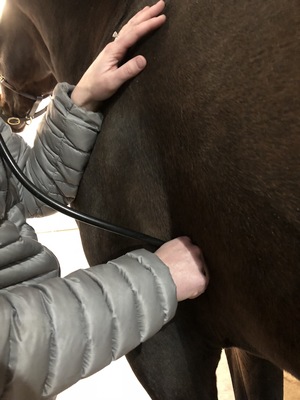Examinations, Vaccinations, and Deworming

Annual wellness examinations are strongly recommended to help maintain your horse’s health. Wellness examinations may help detect subtle changes in your horse before they become more significant problems. Regular vaccination and deworming are recommended to prevent or mitigate a number of serious diseases. Each horse’s vaccination and deworming program is tailored to that horse’s needs.
Annual Physical Examinations
A thorough physical examination of a horse is a great way to better understand that horse and to help create an overview for the types of medical and dietary considerations that may arise for your horse in the near future. It is also an excellent opportunity to discuss any questions or concerns that you may have about your horse. Planning ahead at this meeting may help your horse avoid health concerns and facilitate keeping athletic programs on track. Annual bloodwork (CBC/Chemistry) can also be added to this wellness exam to screen for additional information on internal wellness.
Vaccination
Annual vaccination is strongly recommended for horses. Renier Equine supports the principle that core vaccines for horses at this time include annual vaccination against rabies, West nile, tetanus, Eastern equine encephalitis (EEE), and Western equine encephalitis (WEE). Dr. Renier also recommends vaccination against equine respiratory viruses, especially equine influenza virus and equine herpes virus (aka flu/rhino). Additional vaccinations may be appropriate and are recommended based on a horse’s environment and travel. Please note that foals require a different vaccination schedule than adult horses.
Deworming
Parasites in horses have shown significant resistance to dewormers in recent years, so it is important to understand when and when not to administer a dewormer. Renier Equine recommends need-based deworming, as determined by quantitative fecal egg counts. We want to ensure that horses are adequately dewormed so as to avoid parasite burdens that cause colic and weight loss. We also want to avoid deworming them when there is no clear benefit to doing so.


